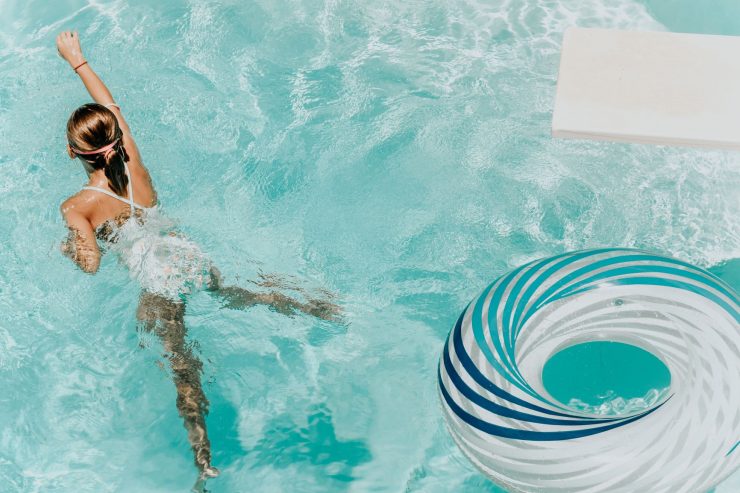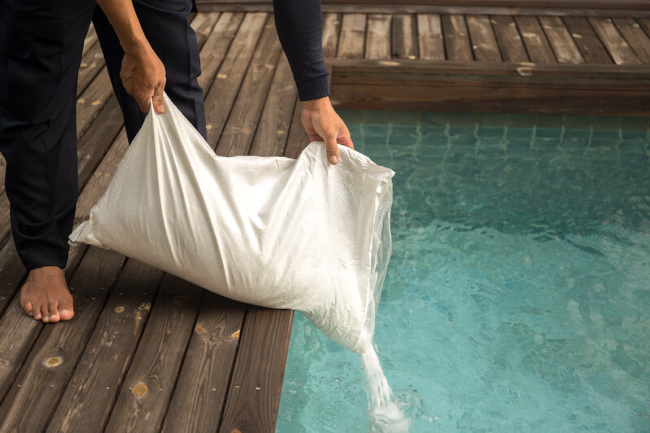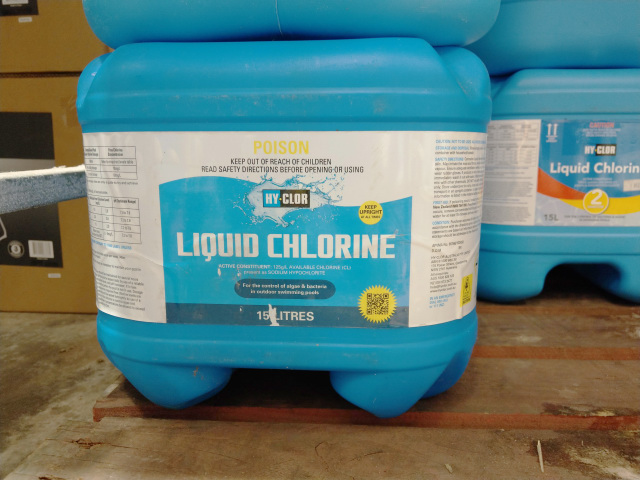So, you’ve noticed that your chlorine pool water tastes salty, and perhaps you’re looking for a quick fix to the issue. To do that, we’ll first have to dissect the cause, which is what we’ll be looking at in this article.
There can be several reasons why the chlorine pool water might taste salty, the biggest suspects being that you have a saltwater pool, or your pool used to be a saltwater pool, you’ve used liquid chlorine to shock your pool, or that there is an increase in TDS level.
Now, let’s take a closer look at these scenarios so that you’ll know exactly what you’re dealing with and subsequently find a clear solution to the problem.

Some of the most common reasons why your chlorine pool water may taste salty are that:
- You have a saltwater pool
- Your pool used to be a saltwater pool
- Salt has been purposely added to the water for a better experience
- You’ve used liquid chlorine
- There is an increase in the total dissolved solids (TDS) of the water
Article Contents
1. Your Pool is a Saltwater Pool
A salt pool, contrary to popular belief, contains chlorine just like a typical chlorine pool. The only difference is that, instead of manually adding chlorine, the pool used a saltwater generator to create the chlorine from saltwater.
Salt’s chemical name is sodium chloride (NaCl). Therefore, you can create natural chlorine for your pool instead of using chlorine granules by using a chlorine generator, which separates chlorine and sodium from salt.
2. Your Pool was Converted into a Chlorine Pool
Of course, there’s always the possibility that your pool used to be a salt pool that was converted into a chlorine pool. A saltwater pool has salt added to the water.
When converting a saltwater pool to a chlorine pool, it isn’t necessary to remove the salt from the water. This might explain why the water in your chlorine pool tastes salty.
3. Salt was Added for a Better Experience
One of the benefits of using a salt pool, instead of your typical chlorine pool, is the overall better feel of the water.
Though it isn’t for everyone, some people feel that adding salt to the water of their chlorine pool will enhance their experience in the pool. So it’s possible that someone may have added salt to your pool, which has made the water taste salty.

4. You’ve Used Liquid Chlorine
If you’re sure your pool isn’t or wasn’t a saltwater pool and you’re sure no one has added salt to the water, then maybe you’re using liquid chlorine. Liquid chlorine will leave salt as a byproduct.
In fact, liquid chlorine leaves about 17 ppm of salt per gallon of chlorine you use in a 10,000-gallon pool. That 17 ppm might not seem like much at first, but it can quickly add up if you use liquid chlorine to chlorinate or shock your pool every week.
When the salt levels get to around 3,000 – 3,500 ppm, you’ll be able to taste salt in the water.

5. An Increase in TDS Might Be to Blame
After having gone through the article so far, you might be wondering why your chlorine pool water is salty even though you’re sure you haven’t added any salt. The answer might lie in the amount of total dissolved solids, or TDS, in your pool.
When you have an increase in TDS, it usually means that there’s an issue with the chemical composition of your water.
TDS is simply everything that’s dissolved in your water. Therefore, many things can be classified as TDS, such as metals, minerals, salts, and other organic matter. Since it incorporates nearly everything that’s in your water, you can probably see why it’s easy for TDS levels to increase over time.
Usually, the first indicator you’ll notice when the TDS level is above a certain level is the change in water “flavor” such as bitterness or saltiness. If you do taste salt, you should conduct a test for TDS using the Langelier Saturation Index (LSI), because not only can TDS impact the taste of water, but it can also damage the pool fabric, degrade the filter and pump, and create scale around the pool.
The LSI is used to measure the overall corrosiveness of the chlorine water using various factors such as TDS, alkalinity, and water temperature.
If you have high amounts of metals in the water, check out this article: How to Remove Iron from Pool Water (Water High with Iron)
How to Test If You Have Salt in the Water
There’s one sure way to know if you have a large quantity of salt in your water. Test the salinity levels.
Saltwater pool owners do this on a regular basis to ensure they have enough salt in the water. You can also test to find out if you have a lot of salt in the water.
To put your test results in perspective, saltwater pools usually have a salt level of 3000-3500 ppm. The water in a saltwater pool usually tastes salty. If you have anything above 2000 ppm of salt, the chances are your pool has had salt added to the water or used to be a saltwater pool.
And that’s the reason your pool water tastes salty.
Use a pool salt test kit like this one to test the water:
Final Thoughts
Hopefully, this article proved useful in helping you determine the cause of the saltiness in your chlorine pool water. Whether it be intentional or not, the cause of the saltiness usually shouldn’t be too difficult to determine.
Once you have zeroed in on the cause, you’ll be able to determine the best way of clearing the issue, which we’ve hopefully covered in one of our other articles. Good luck!


